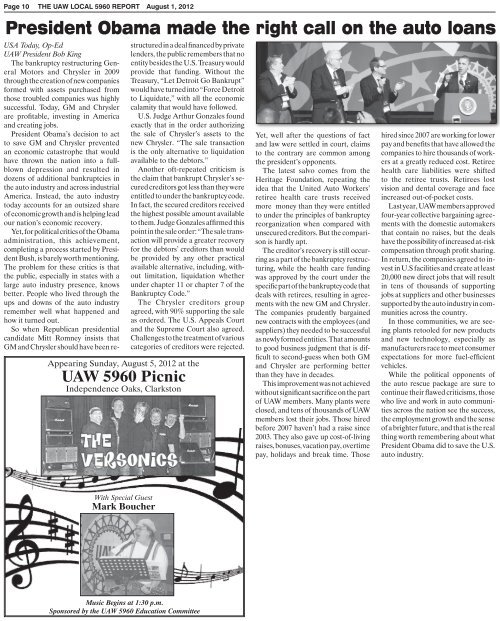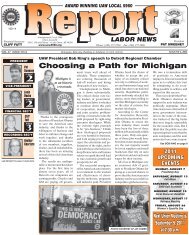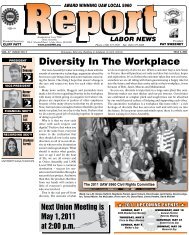Bread and Roses strike - UAW Local 5960
Bread and Roses strike - UAW Local 5960
Bread and Roses strike - UAW Local 5960
Create successful ePaper yourself
Turn your PDF publications into a flip-book with our unique Google optimized e-Paper software.
Page 10 THE <strong>UAW</strong> LOCAL <strong>5960</strong> REPORT August 1, 2012<br />
President Obama made the right call on the auto loans<br />
USA Today, Op-Ed<br />
<strong>UAW</strong> President Bob King<br />
The bankruptcy restructuring General<br />
Motors <strong>and</strong> Chrysler in 2009<br />
through the creation of new companies<br />
formed with assets purchased from<br />
those troubled companies was highly<br />
successful. Today, GM <strong>and</strong> Chrysler<br />
are profitable, investing in America<br />
<strong>and</strong> creating jobs.<br />
President Obama’s decision to act<br />
to save GM <strong>and</strong> Chrysler prevented<br />
an economic catastrophe that would<br />
have thrown the nation into a fullblown<br />
depression <strong>and</strong> resulted in<br />
dozens of additional bankruptcies in<br />
the auto industry <strong>and</strong> across industrial<br />
America. Instead, the auto industry<br />
today accounts for an outsized share<br />
of economic growth <strong>and</strong> is helping lead<br />
our nation’s economic recovery.<br />
Yet, for political critics of the Obama<br />
administration, this achievement,<br />
completing a process started by President<br />
Bush, is barely worth mentioning.<br />
The problem for these critics is that<br />
the public, especially in states with a<br />
large auto industry presence, knows<br />
better. People who lived through the<br />
ups <strong>and</strong> downs of the auto industry<br />
remember well what happened <strong>and</strong><br />
how it turned out.<br />
So when Republican presidential<br />
c<strong>and</strong>idate Mitt Romney insists that<br />
GM <strong>and</strong> Chrysler should have been restructured<br />
in a deal financed by private<br />
lenders, the public remembers that no<br />
entity besides the U.S. Treasury would<br />
provide that funding. Without the<br />
Treasury, “Let Detroit Go Bankrupt”<br />
would have turned into “Force Detroit<br />
to Liquidate,” with all the economic<br />
calamity that would have followed.<br />
U.S. Judge Arthur Gonzales found<br />
exactly that in the order authorizing<br />
the sale of Chrysler’s assets to the<br />
new Chrysler. “The sale transaction<br />
is the only alternative to liquidation<br />
available to the debtors.”<br />
Another oft-repeated criticism is<br />
the claim that bankrupt Chrysler’s secured<br />
creditors got less than they were<br />
entitled to under the bankruptcy code.<br />
In fact, the secured creditors received<br />
the highest possible amount available<br />
to them. Judge Gonzales affirmed this<br />
point in the sale order: “The sale transaction<br />
will provide a greater recovery<br />
for the debtors’ creditors than would<br />
be provided by any other practical<br />
available alternative, including, without<br />
limitation, liquidation whether<br />
under chapter 11 or chapter 7 of the<br />
Bankruptcy Code.”<br />
The Chrysler creditors group<br />
agreed, with 90% supporting the sale<br />
as ordered. The U.S. Appeals Court<br />
<strong>and</strong> the Supreme Court also agreed.<br />
Challenges to the treatment of various<br />
categories of creditors were rejected.<br />
Appearing Sunday, August 5, 2012 at the<br />
<strong>UAW</strong> <strong>5960</strong> Picnic<br />
Independence Oaks, Clarkston<br />
Yet, well after the questions of fact<br />
<strong>and</strong> law were settled in court, claims<br />
to the contrary are common among<br />
the president’s opponents.<br />
The latest salvo comes from the<br />
Heritage Foundation, repeating the<br />
idea that the United Auto Workers’<br />
retiree health care trusts received<br />
more money than they were entitled<br />
to under the principles of bankruptcy<br />
reorganization when compared with<br />
unsecured creditors. But the comparison<br />
is hardly apt.<br />
The creditor’s recovery is still occurring<br />
as a part of the bankruptcy restructuring,<br />
while the health care funding<br />
was approved by the court under the<br />
specific part of the bankruptcy code that<br />
deals with retirees, resulting in agreements<br />
with the new GM <strong>and</strong> Chrysler.<br />
The companies prudently bargained<br />
new contracts with the employees (<strong>and</strong><br />
suppliers) they needed to be successful<br />
as newly formed entities. That amounts<br />
to good business judgment that is difficult<br />
to second-guess when both GM<br />
<strong>and</strong> Chrysler are performing better<br />
than they have in decades.<br />
This improvement was not achieved<br />
without significant sacrifice on the part<br />
of <strong>UAW</strong> members. Many plants were<br />
closed, <strong>and</strong> tens of thous<strong>and</strong>s of <strong>UAW</strong><br />
members lost their jobs. Those hired<br />
before 2007 haven’t had a raise since<br />
2003. They also gave up cost-of-living<br />
raises, bonuses, vacation pay, overtime<br />
pay, holidays <strong>and</strong> break time. Those<br />
hired since 2007 are working for lower<br />
pay <strong>and</strong> benefits that have allowed the<br />
companies to hire thous<strong>and</strong>s of workers<br />
at a greatly reduced cost. Retiree<br />
health care liabilities were shifted<br />
to the retiree trusts. Retirees lost<br />
vision <strong>and</strong> dental coverage <strong>and</strong> face<br />
increased out-of-pocket costs.<br />
Last year, <strong>UAW</strong> members approved<br />
four-year collective bargaining agreements<br />
with the domestic automakers<br />
that contain no raises, but the deals<br />
have the possibility of increased at-risk<br />
compensation through profit sharing.<br />
In return, the companies agreed to invest<br />
in U.S facilities <strong>and</strong> create at least<br />
20,000 new direct jobs that will result<br />
in tens of thous<strong>and</strong>s of supporting<br />
jobs at suppliers <strong>and</strong> other businesses<br />
supported by the auto industry in communities<br />
across the country.<br />
In those communities, we are seeing<br />
plants retooled for new products<br />
<strong>and</strong> new technology, especially as<br />
manufacturers race to meet consumer<br />
expectations for more fuel-efficient<br />
vehicles.<br />
While the political opponents of<br />
the auto rescue package are sure to<br />
continue their flawed criticisms, those<br />
who live <strong>and</strong> work in auto communities<br />
across the nation see the success,<br />
the employment growth <strong>and</strong> the sense<br />
of a brighter future, <strong>and</strong> that is the real<br />
thing worth remembering about what<br />
President Obama did to save the U.S.<br />
auto industry.<br />
With Special Guest<br />
Mark Boucher<br />
Music Begins at 1:30 p.m.<br />
Sponsored by the <strong>UAW</strong> <strong>5960</strong> Education Committee









